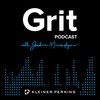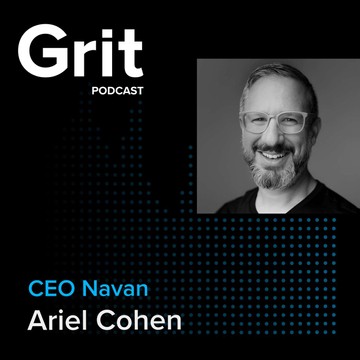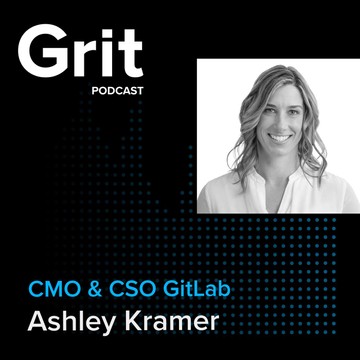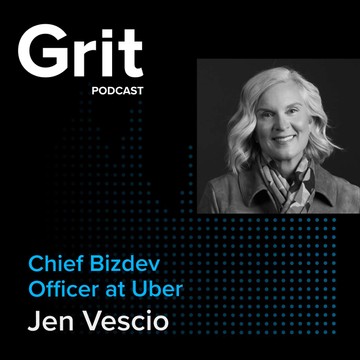

Grit
Kleiner Perkins
Grit explores what it takes to create, build, and scale world-class organizations. It features weekly episodes highlighting the leaders who are pushing their companies to make a difference. This series is hosted by Joubin Mirzadegan, go to market operating partner at Kleiner Perkins, a venture capital firm investing in history-making founders.
Episodes
Mentioned books

19 snips
Jun 19, 2023 • 1h 15min
#143 CEO HashiCorp, Dave McJannet: Phase Shifts
Guest: Dave McJannet, CEO of HashiCorpTo scale a company effectively, says HashiCorp CEO Dave McJannet, you will have to make something like 10 decisions every single day. “There’s generally one that really needs to be right, but there are eight that if you get them wrong, you will cause real damage to yourself,” he says. “It won’t be fatal, and a lot of times, it’s cultural damage.” Sometimes, he adds, these decisions can seem innocuous, like deciding how to run internal town halls with workers. But even small choices can create a “cultural crater” that you’ll have to dig yourself out of three months later.In this episode, Dave and Joubin discuss returning to the office, the sales data flow, unstructured problem-solving, why companies grow like trees, anonymous town halls entrepreneurs-in-residence, go to market vs. product, committing to the job, the executive “CPU tax,” and the 30-to-100 phase shift. In this episode, we cover:In-person vs. remote collaboration (00:43)How to build any kind of business (05:26)The value of being in the sales motion (07:30)Thinking like a venture capitalist (11:51)Commiserating with other CEOs (13:28)Systems-based thinking (17:37)Administrators vs. builders (20:25)The daily 10 decisions (22:29)Staving off decision fatigue (24:17)Dave’s past jobs and the path to CEO (26:01)The reluctant CEO (28:46)Rapid change vs. high-profile maintenance (32:20)The pressure of being at the top (35:12)The state of HashiCorp when Dave arrived (37:39)How he got the CEO job (40:38)Product-building POV (45:50)The first “oh shit” moment (48:48)Being motivated by competition (50:47)Laddered time horizons (53:47)Paul Moritz and empathy (55:17)Misconceptions about CEOs (57:10)Deciding to go public (59:45)Time and energy management (01:03:10)Anticipating phase shifts (01:06:12)Fierce independence (01:08:12)Getting the right feedback (01:09:13)Who HashiCorp is hiring and what “grit” means to Dave (01:12:30)Links:Connect with DaveTwitterLinkedInConnect with JoubinTwitterLinkedInEmail: grit@kleinerperkins.com Learn more about Kleiner PerkinsThis episode was edited by Eric Johnson from LightningPod.fm

17 snips
Jun 12, 2023 • 1h 17min
#142 President of DocuSign, Robert Chatwani: Get Uncomfortable
Guest: Robert Chatwani, President and General Manager of Growth at DocuSignRobert Chatwani’s first reinvention was in his early 20s, when he left McKinsey & Company to start a people-powered commerce startup called MonkeyBin. And in the ensuing decades, his entrepreneurial energy hasn’t slowed down, with hops to eBay, Spring, Atlassian, and now DocuSign, where he is the President and General Manager of Growth. He cites a “healthy anxiety” that comes from getting too comfortable in any role, where he finds himself solving the same problems over and over again; but when you’re in a little bit over your head, Robert explains, “that’s a good place to be, because that’s where the best learning comes from.”In this episode, Robert and Joubin discuss trusting your intuition, reinventing yourself, personal boards of advisors, people-powered commerce, betting on people, career coaching, taking time for family, being the same person in every room, bone marrow donors, energy takers vs. creators, and leading with empathy.In this episode, we cover:Networking through venture capitalists (02:18)Leaving high-profile jobs (04:29)How to know when it’s time to leave (07:55)12 years at eBay (11:05)The seeds of doubt (15:10)Finding purpose in company-building (17:51)Robert’s personal mission statement (21:01)Growing up in Chicago and his parents (24:40)Losing a parent (27:16)True North by Bill George (29:35)Finding ways to be human (32:45)What accomplishment Robert is most proud of (34:35)MonkeyBin and meeting eBay (36:08)Sameer Bhatia’s battle with leukemia (38:30)Building a global bone marrow campaign (42:38)“You can’t control every outcome” (48:07)Unexpected side effects (52:56)Business is a force for good (56:26)Working at Spring, and then Atlassian (01:00:01)Self-doubt and leaving Atlassian (01:06:29)Making tough calls with IQ & EQ (01:10:24)Who DocuSign is hiring, and what “grit” means to Robert (01:13:48)Links:Connect with RobertLinkedInConnect with JoubinTwitterLinkedInEmail: grit@kleinerperkins.com Learn more about Kleiner PerkinsThis episode was edited by Eric Johnson from LightningPod.fm

6 snips
Jun 5, 2023 • 1h 17min
#141 CEO Navan, Ariel Cohen: Be Naive!
Guest: Ariel Cohen, CEO and co-founder of NavanAs a business travel-focused startup, Navan (previously known as TripActions) was heavily impacted by the coronavirus pandemic in 2020; after laying off 24% of the staff, CEO Ariel Cohen says he became a “wartime CEO,” spending three months in “complete denial and just executing.” By June, employees were leaving and he was depressed — but he still believed that business travel would come back. “You cannot just look at a moment and say that it will change everything,” he says. “... I disconnected from the news and from some of our investors and from ... negativity and started to lead the company again.” In a way, he explains, it was like a reset to the earliest days of the business, because the only people left were long-term believers like him.In this episode, Ariel and Joubin discuss “tier one” VCs, developing goodwill, company money vs. employee money, wartime CEOs, putting handcuffs on founders, staying dynamic, returning to the office, scuba diving, shared values, Macallan whisky, believing in startups, losing employees, in-person connections, secondary liquidity, and “deposits and withdrawals.”In this episode, we cover:Picking the right investors (01:22)Connecting to the Matrix (04:04)Obsessing over failure (10:29)Reflecting on an eight-year journey (14:56)The benefits of naïveté (17:50)Ariel’s entrepreneur father and early jobs (20:45)Older startup founders (23:03)Getting out of large companies (25:35)Personal burn rate (28:03)Becoming the big company (30:11)Pivoting into AI (32:44)Project Reset and personally resetting (34:12)Making controversial decisions (39:55)“What could I have done better?” (45:43)Ariel’s co-founder Ilan Twig (47:04)What makes a co-founder relationship work? (48:50)Running out of cash (51:18)Being a travel startup during COVID (55:53)The depression quarter (01:00:12)Long-term believers (01:02:54)Why Navan would go public (01:07:55)Startup advice and hard-charging CEOs (01:11:27)What “grit” means to Ariel and who Navan is hiring (01:15:24)Links:Connect with ArielLinkedInEmail: ariel@navan.comConnect with JoubinTwitterLinkedInEmail: grit@kleinerperkins.com Learn more about Kleiner PerkinsThis episode was edited by Eric Johnson from LightningPod.fm

May 29, 2023 • 1h 6min
#140 CRO Walmart, Seth Dallaire: How You Show Up
Guest: Seth Dallaire, CRO at WalmartWhen Seth Dallaire was approached by Walmart about joining their team as CRO, he had one question: Are they serious? Seth knew that Walmart wanted him for his digital experience, having worked at Instacart and Amazon, but he also knew that building alternative revenue streams at a traditional retailer could be an uphill battle. “I knew I was gonna have to [fight the fight], it was just whether I’d have the air cover from up top to say, ‘This is strategic,’” Seth recalls. “And they obviously convinced me of that and we’re making really good progress.”In this episode, Seth and Joubin discuss startup success, advertising attribution, “maintenance mode,” online grocery shopping, “the ultimate tailwind,” over-buying, digital vs. traditional retail, founder-led businesses, John Furner and Doug McMillon, sentiment vs. data, getting told “no,” the theory of constraints, and why you should visit Bentonville.In this episode, we cover:Seth’s unique career path (00:59)Amazon’s elite team in 2000 (05:24)Growing up & dinner table conversations (08:25)Work-life balance (10:53)Ambition and achievement (12:08)Investing in yourself (16:04)Recommitting to a role (17:38)Leaving Amazon for Instacart (20:14)Grocery stores are underrated (23:56)Transitioning to a much smaller company (25:33)How COVID accelerated Instacart’s business (27:54)Advertising is a full-contact industry (32:03)Getting recruited by Walmart (34:06)Visiting Walmart stores with other execs (40:08)A leadership lesson from Doug McMillon (43:10)Product orientation (45:40)Compounding knowledge capital (47:57)Tough feedback (50:19)Leaving a team behind (54:34)Hand-written notes (56:04)The Goal and On the Shortness of Life (57:35)Relocating and refueling (01:00:40)Who Seth is hiring and what “grit” means to him (01:02:25)Links:Connect with SethLinkedInConnect with JoubinTwitterLinkedInEmail: grit@kleinerperkins.com Learn more about Kleiner PerkinsThis episode was edited by Eric Johnson from LightningPod.fm

59 snips
May 22, 2023 • 1h 17min
#139 CEO Coach, Matt Mochary: Coaching Greatness
Guest: Matt Mochary, CEO of Mochary MethodMatt Mochary was only 31 when he sold the company he co-founded, Totality, to Verizon, “and I made enough money that that was it,” he recalls. “I didn’t have to make more money anymore.” Instead, he decided to pursue projects that in one way or another would help other people, including a documentary about the slums of Rio de Janeiro and a program to train ex-convicts in the skills of legitimate work. Today, he coaches tech and finance leaders such as Brian Armstrong (CEO Coinbase), Bastian Lehmann (CEO Postmates), Sam Altman (CEO OpenAI), and Steve Huffman (CEO Reddit). All the money earned from that work, he says, bypasses his bank account and is funding the development of software that will teach tech workers the “Mochary Method.”In this episode, Matt and Joubin discuss information asymmetry, GPT-4, focusing on fun, coaching software, saving people, the slums of Rio and the South Bronx, surfing vs. friends, the merits of crappy solutions, why companies fail, shadowing the CEO, feedback and resentment, pissing people off, the danger of “excellence,” and energy audits.In this episode, we cover:Putting in effort, finding value (01:11)OpenAI CEO Sam Altman (05:43)Immediate responsiveness (09:48)“Mount Rushmore” referrals (11:54)When Matt’s coaching was free (15:08)His Hungarian grandfather and World War II (19:56)The hero complex (25:12)Stepping away from the game (31:30)Billionaires and inner peace (38:45)The phases of company-building (40:54)The problems Matt helps leaders solve (47:48)“It’s fun to be a founder!” (54:35)Craving feedback (56:48)The zones of excellence and genius (01:02:19)“Today, what went right?” (01:09:12)Growing too early (01:12:32)Who Matt is hiring and what “grit” means to him (01:15:00)Links:Connect with MattTwitterLinkedInConnect with JoubinTwitterLinkedInEmail: grit@kleinerperkins.com Learn more about Kleiner PerkinsThis episode was edited by Eric Johnson from LightningPod.fm

20 snips
May 15, 2023 • 1h 10min
#138 CEO Motive, Shoaib Makani w/ Ilya Fushman: Powering the Physical Economy
Guest: Shoaib Makani, CEO of Motive“When we fail,” says Shoaib Makani, “it is because we have not understood the customer problem deeply and allowed them to guide us.” This wisdom is hard-won: Motive’s first product, an app for fleet management of trucks, idled for four years before becoming a runaway success story. Emboldened by this, the CEO tried to make an orthogonal push into all kinds of freight, “guns blazing,” only to realize six months in that he had way overestimated Motive’s competitive advantage. Retreating from freight was “painful,” Shoaib recalls, but helped the company extend its existing lead in trucking — and may have saved the whole business. In this episode — joined by special guest Ilya Fushman from Kleiner Perkins — Shoaib and Joubin discuss curiosity for the world, first impressions, reorienting yourself, electronic logging devices, directly connecting with customers, growing up as a CEO, waiting for the market, having a “low discount rate on the future,” the physical economy TAM, AI dash cams, and pricing in risk, and running out of runway.In this episode, we cover:Shoaib’s Pakistani parents and doing extra homework (01:17)Explaining and experiencing startups (04:26)“High standards are infectious” (08:15)What Motive does (10:08)How Shoaib and Ilya met (10:54)The origins of Motive as “Keep Truckin’” (14:06)Working with friends (17:27)First-time founders (21:56)Deep empathy for users (24:01)Monetization and second-guessing (25:48)Sudden success and scale (29:12)Recruiting top talent (31:04)Shoaib and Ilya’s personal-professional relationship (32:07)“I knew the board I wanted” (34:32)Motive’s failed expansion into freight (36:21)Realizing and correcting the error (39:26)How to make smarter future bets (44:09)Second and third products (47:29)Back to the core mission (50:36)Autonomous driving vs. AI assistants (52:17)Thinking about competition (55:05)A tough conversation about runway (58:52)Sticking your neck out for your partner (01:04:09)Losing Ilya as a board member (01:06:23)Who Motive is hiring (01:08:32)What “grit” means to Shoaib (01:09:32)Links:Connect with ShoaibTwitterLinkedInConnect with IlyaTwitterLinkedInConnect with JoubinTwitterLinkedInEmail: grit@kleinerperkins.com Learn more about Kleiner PerkinsThis episode was edited by Eric Johnson from LightningPod.fm

May 8, 2023 • 1h 4min
#137 CEO Oura, Tom Hale: Business & Backgammon
Guest: Tom Hale, CEO of OuraWhen he was growing up, Tom Hale’s family had pretty ordinary dinner-table conversations: What happened today, how was school, etc. But every day after dinner, Tom and his father would play backgammon, an experience that indirectly taught him a lot about business. Now the CEO of wearable health company Oura, he recalls that the game helped him understand risk-taking, strategy, pattern recognition, and more. Tom’s father also insisted they play for money: “If I could win 20 bucks, I could go down to the store and get something. But when I lost, I felt the sting of it. That’s the best teacher, because you’re learning the preciousness of the decisions you make.”In this episode, Tom and Joubin discuss Tom’s radio voice, games of chance and skill, vacation rentals pre- and post-Airbnb, “irritant” service fees, health tracking, the psychology of rebranding, the consumerization of healthcare, personalized medicine, the myth of the founder-hero, rowing machines, and the meaning of work.In this episode, we cover:Returning to the office (00:50)John Doerr and Macromedia (05:15)Post-dinner backgammon (08:01)Tom’s past jobs and HomeAway (11:31)Competing against private startups (16:09)How Airbnb captured demand (18:55)Being acquired by Expedia (24:26)What Oura’s smart rings do (26:13)Rebranding SurveyMonkey to Momentive (29:55)Leaving Momentive for Oura (31:54)Making the case for himself (34:59)The future of public health, data, and wearables (37:10)“Sleep is strategic” (42:32)Why Oura is an AI company (44:48)The health impact of a taxing job (47:16)Being a non-founder CEO (49:39)Working with people (53:38)What would be in a “working with Tom” doc? (54:52)Managing the psychology of a 10-year-old startup (56:48)Being there for family & colleagues (59:18)Who Oura is hiring, and what “grit” means to Tom (01:02:54)Links:Connect with TomTwitterLinkedInConnect with JoubinTwitterLinkedInEmail: grit@kleinerperkins.com Learn more about Kleiner PerkinsThis episode was edited by Eric Johnson from LightningPod.fm

May 1, 2023 • 1h 4min
#136 COO Modern Treasury, Rachel Pike: Golden Ticket
Guest: Rachel Pike, COO at Modern TreasuryPayment operations startup Modern Treasury is not afraid to do things in “our own weird way,” says COO Rachel Pike. Its values statement is a 150 word essay, it has gone viral by writing about nerdy ACH payments minutiae, and it has an unusual rule for quarterly internal reviews: No slides. Instead, departments have to write one to two page essay, which are packaged together and then shared company-wide, and with the board. In previous jobs, Rachel laments, she and her coworkers would waste time “pushing pixels” around 50-slide decks. “It [the essay] actually takes more thinking and less hours to put together a summary of, ‘where have we been?’” she says.In this episode, Rachel and Joubin discuss the state of San Francisco, the value of tradition, hunger to learn, the Draper Fisher Jurvetson split, the opportunity cost of staying put, HIPAA and startups, two-entrepreneur households, career transition coaching, “try before you buy” hiring, learning to be remote, the downside of grasping, and fixing inequalities in compensation.In this episode, we cover:Why Rachel doesn’t like talking about herself (01:20)Job-hopping and the Bay Area (02:38)Early adopters vs. brilliant innovators (05:16)Why Rachel left academia (07:44)“I got a phD in startups” (10:24)The “nights and weekends” gig at AngelList (14:05)Describing startups to aliens (16:50)Four years at Grand Rounds (18:28)What makes Modern Treasury “modern” (21:51)How she got hired as employee #1 (24:16)Advice for wannabe early-stage startup workers (30:18)“Wonder is contagious” (32:00)“Do it right the first time” (35:09)Hacker News and other growth levers (38:20)The excitement of scaling (40:49)Advisors and quarterly planning essays (44:02)Forced prioritization (49:20)Hard feedback (51:50)The working with Rachel doc (54:19)How Modern Treasury does comp and bonuses (57:21)What’s past is prologue (59:43)Who Modern Treasury is hiring and what “Grit” means to Rachel (01:02:00)Links:Connect with RachelTwitterLinkedInConnect with JoubinTwitterLinkedInEmail: grit@kleinerperkins.com Learn more about Kleiner PerkinsThis episode was edited by Eric Johnson from LightningPod.fm

7 snips
Apr 24, 2023 • 1h 12min
#135 CMO & CSO GitLab, Ashley Kramer: The Three Ps
Guest: Ashley Kramer, CMO & CSO of GitLabOne day, when Ashley Kramer was an SVP at Alteryx, one of her direct reports hit her with a dose of reality: “She said, ‘I think you are trying to put me on a path to be you, and to have your job. I don’t want any of that.’” Now the CMO and CSO of GitLab, Kramer — who has been a perfectionist since childhood — used to hold her team to the same high bar. But as she’s learned over time, “Not everybody’s gonna have your same ambition. Not everybody’s gonna work as hard as you. It doesn’t mean they’re not good at their job. It just means different things are important to them.”In this episode, Ashley and Joubin discuss what companies get wrong in CEO interviews, “the three P’s” of company values, loosely held disasters, thinking about the future, “everybody does not want to be like me”, how GitLab does meetings, pre-speech nervousness, context switching, skip-level meetings, credibility with the customer, setting the bar too high, and Naval Ravikant.In this episode, we cover:People, Passion, and Product (04:36)Joining companies right after they IPO (07:16)Scaling questions (10:28)Job-hoppers and ambition (12:06)Parents and dinner-table conversations (16:35)Coping with perfectionism (19:17)Coaching and demotivators (21:36)Confident public speaking (26:21)How Ashley got out of engineering (32:08)Being CPO and CMO of Sisense at the same time (35:49)Representing “two constituencies” (38:54)Why Ashley has two titles again (44:59)The radical transparency of GitLab (47:20)Growing pains and becoming interim CTO (51:28)Working with founder-CEOs (56:08)Tough feedback (58:20)Personal and professional OKRs (01:01:15)Work-life balance (01:03:33)How to network (01:06:10)Who GitLab is hiring and the meaning of “Grit” (01:08:58)Links:Connect with AshleyTwitterLinkedInConnect with JoubinTwitterLinkedInEmail: grit@kleinerperkins.com Learn more about Kleiner PerkinsThis episode was edited by Eric Johnson from LightningPod.fm

13 snips
Apr 17, 2023 • 1h 20min
#134 Chief Bizdev Officer at Uber, Jen Vescio: Buy, Build, or Partner
Guest: Jen Vescio, Chief Business Development Officer at Uber and founder of Awestruck VenturesIf you were to look at Jen Vescio’s calendar, it might look like a pack of Skittles: Every single one of her meetings is color-coded according to the Insights Color Focus system, which assigns the colors red, blue, yellow, and green based on what methods they emphasize in their work. As the chief business development officer of Uber, Jen has to work with people across that spectrum, and preps for each meeting accordingly.In this episode, Jen and Joubin discuss the pros and cons of media training, Malcolm Gladwell’s Outliers, “semi-pro” soccer, how to ruin your Uber rating, the “fluorescent light” journey, working at “it” companies before they were disrupted, the art and science of business development, self-awareness vs. understanding others, Sean Bratches, what is your motive?, side letter PTSD, “speed and silence are your two worst enemies,” forced time off, getting buy-in, and why “Uber is wired for trauma.”In this episode, we cover:“Dancing in the moment” (00:54)The Olympic Development Program (03:22)Jen’s parents (08:15)DJing and music in Ubers (10:40)Talking to Uber drivers (12:48)Retiring from soccer (15:04)“The big transition” (17:22)The dotcom boom and Jen’s first jobs (20:04)Innovation and disruption (22:15)Buy, build, or partner (27:24)Understanding the “color” of others (35:27)How to talk to a “double red” (38:38)Insights Color Focus and the color of companies (41:16)The Trust Quotient (46:45)The biggest deal Jen has brokered (50:17)The pressure of big deals (51:46)The $350 million deal she botched (55:14)Getting burned out on corporate jobs (58:22)Big, shiny brands like Uber (01:00:38)Mental contracts and taking time off (01:05:07)Tough feedback (01:08:24)Developing trust internally vs. externally (01:09:48)How COVID impacted Uber (01:13:08)Where Uber is hiring and what Jen thinks of when she hears the word “Grit” (01:18:16) Links:Connect with JenTwitterLinkedInConnect with JoubinTwitterLinkedInEmail: grit@kleinerperkins.com Learn more about Kleiner PerkinsThis episode was edited by Eric Johnson from LightningPod.fm


